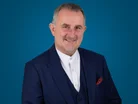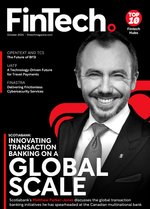Executive Insight: Nelson Wootton & Steve Round

Can you talk to us about the foundership path of SaaScada?
Steve Round: I've known Nelson since 2001-2002, working on different projects and businesses. We secured some funding to launch the Change Account, which was to be the first cloud-based core banking platform for people on low incomes, and was delivered through several charities. We designed more than a hundred different screens for how it should look and Nelson and his IT team built it. This was pre-Monzo and pre-Revolut and we launched in April 2015 through those charities.
Around 2016, Nelson and I began discussing the possibility of white-labelling our product, as we'd received a few inquiries. SaaScada really started taking shape in 2017-2018.
We wanted to create a core banking platform that was truly inclusive and capable of serving people from very low-income to ultra-high net worth – all on the same platform. That's what we've stuck to and that's where we are now.
In essence, we started SaaScada in a very different way from many tech startups. Instead of just setting out to build a banking platform, we built something that we believed could change the world of banking.
How has SaaScada grown since then?
Nelson Wootton: We came to market around 2020, which was challenging for obvious reasons. But we did secure a couple of key deals in that period, followed by an implementation phase. Then we started raising money and marketing.
Since then, which was around a year to a year-and-a-half ago, it has been an absolute rocket ship. We're typically closing a deal a month now, which is phenomenal.
We're now beginning to think about new territories to grow into, as different parts of the world are reaching out to SaaScada saying, 'Hey, you guys are doing something genuinely different.
Come and talk to us about why you do it differently, how you are doing it, and let's see if there's an opportunity to work together.' So, it's super exciting for us at this moment in time.
Core banking is a super interesting space to work in.
The deal cycle is very long – typically a year or more. After signing a contract, there's usually a period of three to nine months, sometimes longer, for onboarding and preparing to launch products.
So, one key thing Steve and I wanted to do differently with SaaScada was to have a real, live product that actually worked with real clients moving money around before we started marketing. This has helped us grow significantly.
How is SaaScada evolving the way core banking is delivered?
Nelson Wootton: There are two key differentiators for SaaScada. Firstly, we built our technology in the last five or six years, running a truly cloud-native platform. We didn't take pre-existing software architecture, virtualise it and stick it in the cloud. We wrote a core banking platform specifically to use cloud technology.
This means that, if no transactions are running through the platform, it's not on. We're not incurring infrastructure costs during that time and we're not running machines that aren't doing anything. As transactions come in, the platform wakes up, does what it needs to do and goes back to sleep if not required.
This is transformational in economic terms, providing infinite scale at approximately a third of the cost of our nearest competitors.
Secondly, our approach to product management is unique. Traditional core banking systems typically use an architecture that's expensive to maintain, slow to deploy and difficult to change.
We've introduced innovations to address these challenges. Building new products in SaaScada's platform takes our clients minutes. If they need functionality that's not in the platform, we can add it within a couple of days – not months or quarters.
Perhaps the most exciting part of our platform is real-time data. In traditional banking, management often waits weeks for information as data is pulled from different systems, combined in spreadsheets and reconciled before reaching decision-makers. That's an eternity in today's economy.
SaaScada's platform provides real-time data, transaction by transaction, as it happens. This different approach to product management and real-time data are two of the key things that set SaaScada apart.
How can FIs/banks ensure they have high-quality data sets?
Nelson Wootton: One of the things that sets SaaScada apart is our approach to data. Whenever a transaction occurs on our platform, we capture and store all the raw data associated with that transaction. This includes data from cloud processors, exchanges and payment systems – we keep every possible piece of information.
We process these transactions as unstructured data because different systems have varying data structures. We then employ a sophisticated eventing system that takes this unstructured data and allows our clients to build bespoke data reports, extracting even the most obscure bits of information buried deep within the data.
This combination gives our clients incredible insight into what's happening inside their bank. The smartest clients use these insights to refine the products they take to market, creating a cyclical process. It enhances their ability to launch new products quickly and see which products are performing well and which aren't.
This whole process feeds back on itself, creating a continuous loop of improvement and innovation. It's quite different from anything else in the market, enabling a level of data-driven decision-making that's truly transformative for our clients.
What efficiencies can a coexistence model provide for banks?
Nelson Wootton: When we talk about coexistence, it's important to understand the context. Replacing a core banking system is akin to open heart surgery while the patient is walking around. It's a terrifying prospect for a financial institution, with so much to lose and, often, little to gain.
At SaaScada, we work with financial institutions differently. Our system can output data in any format, allowing for a coexistence model. We can sit alongside an existing core system and output our data in the same format, feeding into all management information and regulatory reporting with minimal disruption.
This coexistence model is about migrating product by product, running them in parallel with the old system rather than doing a 'big bang' migration. It's a much better route to transformation, de-risking the process and providing innovation in a low-risk way.
By adopting this approach, we're enabling financial institutions to reach for new products and markets without core transformation, which is critical. This combination of factors significantly reduces risk for a bank's board and, ultimately, risk is their number-one concern every time they meet.
How important is financial inclusion for you and how do you define it?
Steve Round: Having chaired The Big Issue Foundation and being on the board of Centenary Bank, the second-largest bank in Uganda which was built on micro-finance and micro-credit, I don't like the term 'financial inclusion'. Let me be clear on that: the reason I don't like it is that it can ghettoise people into a second-class product. People say, 'Oh, you have that; I don't need it, but you have it.'
The whole purpose and passion I have is for financial inclusivity because the best thing you can give anyone in life is self-esteem. No one wants to be part of the 'poor person's bank'. People want access to high-quality financial services at the right price.
SaaScada's technology is built to enable us to support micro-finance institutions in Africa as well as high-net-worth banks in Switzerland on the same platform. This makes the cost of transactions low enough that they can serve more people, while also having a product that can easily link up the chain.
For example, when we first started with the Change Account, we were probably the only player in the UK, maybe even the world, where we had lockable wallets on the product. This allowed users to protect priority payments like rates and rent, preventing them from being spent on a Friday night after too many drinks. That same technology can be used for high-net-worth individuals to manage different currencies, including fiat and crypto.
Tell us about SaaScada’s ‘not on my watch’ mentality for senior managers
Steve Round: Both Nelson and I are slightly crazy because you have to be. Anyone who wants to try and change the world and the planet has to be slightly crazy, enthusiastic and pretty naive because everyone's telling you, ‘you can't do it’.
One of the challenges in the banking fraternity is the post-banking crash introduction of the senior manager certification regime, which makes directors more accountable. This has made decision-making on core banking particularly scary, especially for non-executive directors.
As a business, we're trying to alleviate some of that concern, not only through our technology but also through our thought leadership. We're also highlighting that doing nothing is not an option – banks will lose business if they don't innovate.
Our key message is that coexistence isn't as risky as not doing anything at all. It's about giving comfort and sharing experience. Having sat around board tables, I know what some of those conversations are like. It’s a challenge, but doing nothing is no longer an option.
We're focused on providing reassurance, leveraging our experience and demonstrating that the risks of inaction far outweigh the risks of adopting new technologies and approaches.
If you were trapped on a desert island with three people, who would they be and why?
Nelson Wootton: I initially considered choosing Bear Grylls, but I thought, 'Well, everyone is going to pick him and he might be a bit of a pain to spend time with’. So, I decided to go with Ray Mears instead, as I believe he would be easier to get along with. He would be in charge of ensuring we are fed and watered!
For my next two choices, I wanted to be a bit quirky. The first is Lehua Kamalu, a member of the Polynesian Voyaging Society. They build Polynesian canoes and sail them thousands of miles across the Pacific using only the stars and nature for navigation. She would be a key member of my team.
The second person is Sarah Marquis, a Swiss explorer and author of Wild by Nature. She undertook a remarkable 13,000-mile journey from Siberia to Australia on her own and later asked to be dropped into the Australian Outback, emerging three months later.
With this team, I’m pretty confident they would help get me off that island and back home!
Steve Round: Assuming we can choose religious figures, my first choice is Noah because he could build me a boat. I figure that would be the easiest way to get off the island. I also considered Bear Grylls, but like Nelson I thought, 'Everyone will choose him,' so I went with Ray Mears too.
I also opted for Tim Berners-Lee, as anyone that intelligent – he created the internet! – could probably help us find our way off the island. So, my three choices are Noah, Ray Mears and Tim Berners-Lee, but I believe Noah is the best option since he could build the big boat!
To read the full story in the magazine click HERE
**************
Make sure you check out the latest edition of FinTech Magazine and also sign up to our global conference series - FinTech LIVE 2024
**************
FinTech Magazine is a BizClik brand


